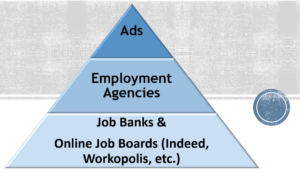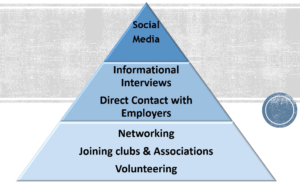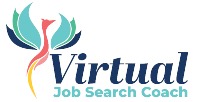Do you have a game plan for your job search? Or are you just throwing spaghetti at walls hoping something will stick – well maybe in your case sending out dozens of resumes and hoping someone will call you for an interview?
To achieve success in your job search you need a game plan! Stay with me and I’ll show you how!
The Game Plan for Job Search:
A Game Plan is put into place in all sports and competitions. A player does not run onto the field and say, “what now?” Nor can an athlete aim for a Gold Medal and just assume they’ll beat the competition. Too many job seekers and career-changers run into the Job Market without a plan and assume they will ‘rise to the top’. And are frustrated and disappointed when they aren’t seeing progress or getting the results they were expecting. Today I am here to increase your awareness and ability to create your own 6 Step Job Search Game Plan.
As a Career Coach and Job Search Strategist, I generally see three basic situations:
- You are unemployed and want to find a new job in the same or similar field of your expertise.
- You are unemployed but want to change into a new field in which you have very little, or no experience at all but have some transferable skills and abilities.
- You are employed but seek to change companies (same field) or change your career path into a new sector and you are unsure if your expertise will transfer easily.
A common factor I see in all types of job seeker situations looks like this:

This is known as the ‘Open Job Market’. This is where current positions are visible and available.
- 90% of job seekers use one or two of these and are competing with hundreds or thousands of other people.
- These 3 represent less than 20% of job opportunities.
- One of the frustrations with the open market is there may be closing dates, little or no opportunity to get more information, or talk to anyone in the hiring company.
These methods can and should be used in a job search game plan but use them less than 20% of your time.
80 to 90% of your time and effort should focus on the ‘Hidden Market’ which can be accessed through:

This represents the ‘Hidden Job Market’ and how it can be accessed by job seekers.
The ‘Hidden Job Market’ and is influenced by these factors:
- Advertising and Recruitment Campaigns are costly and time-consuming.
- Companies/departments are restructuring, expanding.
- In process of creating ‘new’ jobs or revising job descriptions.
- Demographics influence change – over 25% of the workforce is retiring.
- Company impacts: economic changes, long-term leaves.
- Changes in technology, products, processes, legislation requiring different skill sets.
- 15% of newly hired employees don’t complete the probationary period.
Employers benefit from a Hidden Market for a number of reasons:
- Reduction in time and costs: It can take from 4 weeks to 4 months to set up a traditional recruitment plan involving method, creating postings, setting up advertising, screening resumes, shortlisting, conducting interviews, reference checking. Depending on the method, costs vary from $2,000 to $20,000.
- Existing employees can recommend suitable candidates for opportunities.
- People in an employer or hiring manager’s network of contacts may recommend suitable candidates.
- They only need to read a couple of resumes from Hidden Market applicants.
- They need to spend little time with only one or two people to learn what they need to know regarding suitability for a position as it arises.
- It assists them in current and short-term staff planning. They get to know that YOU are available!
Job seekers/career-changers benefit from a Hidden Market because:
- You can target employers of your choice directly.
- You are not in competition for an advertised position.
- You can ask a variety of questions to learn more about the organization.
- You can ask people you connect with for advice on how to approach a decision-maker or the HR department. (this is where LinkedIn can be very valuable)
- The conversation is generally more relaxed than a formal job interview.
- The employer may quickly decide to hire you in order to save time and costs.
- The employer senses you have a genuine interest in their company, not just any job.
Developing A Strategy for Your Game Plan:

Step 1 – Target Employers:
- Make a list of organizations you believe you want to work for.
- Use LinkedIn to locate people in your selected companies. You can also ask to be introduced to connections who may know someone in these companies.
- If you have other social media (such as Facebook, Instagram,) use it wisely and never make any negative comments about people, past employers or organizations in general.
- It is also valuable to consider current trends, specific sector issues, and where the government is focused on spending money. From newspaper articles, websites, trade magazines, and other resources you can gather information and determine organizations you may want to add to your Target List.
Step 2 – Begin to Actively Network:
- This is crucial and is a process you should consider life-long as far as your career goes.
- Create categories of people currently in your network and prioritize close friends/relatives, people you do business with, contacts in clubs/associations/teams you belong to, present/previous colleagues, other volunteers, business associates you have met.
- Begin to converse with people on your list. If you’re employed recognize people you trust, who can be discreet and confidential. Let them know where your focus is currently. Tell them what you might need by way of information, advice, or a contact name.

- Increase your network of contacts by attending events, joining clubs/associations, Chamber of Commerce, Toastmasters, and through volunteering. Even through pandemic times, most of these activities still exist they have just been confirmed to online event formats.
- Obtain business cards, review LinkedIn profiles, Google-search people by name.
- Networking with people you don’t yet know involves a process of exchanging information with them. Focus first on getting to know them, what their occupation is, why they may like (or dislike) the company they are working for. Ask how they found their job and what advice they could give you, and who to approach in their company.
- Networking for your Game Plan development is NOT about attending an event, shaking hands, and seeing how many times you can repeat that. It’s about focusing on making strategic contacts, people who can provide you with useful information, advice, or introduce you to people in their network. This is why LinkedIn is such a powerful online networking tool.
- Remember, networking is about developing relationships that have a business focus.
- Networking has proven to reduce the time it takes to become re-employed.
Step 3 – Become a ‘Detective’:
- Gather information, insider-awareness of corporate culture of organizations and current ‘happenings’.
- Discover the ‘right person’ to request an informational interview with in order to gather the information you want, or to get an opportunity to sit face-to-face in front of a decision-maker.
- Gather clues about whether you are on the right track in your targets, your approach, your career, or job decision.
- Study a particular organization’s website to get a focus on what they are all about, their mission or value statement, their style or culture.
- Try to discover what problems or unique situations a company is experiencing or the changes/impacts that affect them or their sector generally. Gather clues as to salary ranges for the roles you might consider, this will help you if you get to an interview or job offer.
S tep 4 – Informational Interviews:
tep 4 – Informational Interviews:
- These provide unique and valuable opportunities to get the information, clues, and advice you need.
- They are also a ‘discovery opportunity’ for the person you are meeting with. They can see your interest, your purpose in getting the information, and obtain an impression of you, which may result in them recommending you to their superior, the Hiring Manager or a Department Head, or in the case of NFP to a Board Director.
- You need to be prepared with questions you want to get answers to. Check out my video on informational interviews for details on this.
- You also need to listen for more clues. Every company has issues that include: maximizing profit, improving quality or processes, health/safety, productivity, cost reduction, customer relations, research/development, staffing problems, training needs, internal stressors, weak resources, high turnover – and many more!
- After the meeting, review the key points and draw up a letter or email that demonstrates how you can contribute, what benefit hiring or contracting YOU could bring to them?
Step 5 – Develop Your Personal Brand:
- Take a blank sheet of paper and write one sentence – only one that outlines your particular strength or value. Everything else you write about and say about yourself in cover letters, on LinkedIn, during Networking springs from it. It’s your foundational strategy.
- Write a couple of variations until you feel you have captured the essence.
Step 6 – Prospecting:
- This is the act of taking your targets, your information, clues, and brand and deciding on the best method of approach to the individual employer.
- Approaches include: a letter of introduction, an email of introduction, a phone call to request an information meeting, or a personal drop-in visit to the location (but keep in mind for some businesses or industries this may not be the best option during pandemic times).
 Create a daily plan of action. Take the first 30 minutes of every morning and do one of the activities outlined in the above list. Stop thinking about doing it and do it.
Create a daily plan of action. Take the first 30 minutes of every morning and do one of the activities outlined in the above list. Stop thinking about doing it and do it.- At the end of week one, you will have spent a minimum of 2.5 hours activating the hidden job market. Within 4 weeks you will have spent a minimum of 10 hours and you should be getting results.
- Don’t spend 10 hours a month avoiding prospecting. It represents how over 75% of people find their next job. In business, there is a formula known as R.O.I. (Return on investment). The time you invest in prospecting will bring you a greater return for your effort.
I hope you found the steps to creating your Job Search Game Plan helpful and that they help you to find and land your next job!
What you’ve learned here is just the tip of the iceberg when it comes to job search strategies, career development and interview preparation. To learn more, check out my YouTube channel (VirtualJobSearchCoach), where I post new content to help job seekers like you, determine, pursue, and land their dream job!
If you would like one-to-one coaching to equip you with the confidence, necessary tools, critical knowledge, and strategies to find and land your ideal job – then let’s talk! You can book a complimentary 15 minute discover call directly in my calendar at https://calendly.com/virtualstacey and let’s chat about how I can help you fast-track your job search success.


